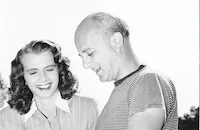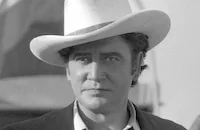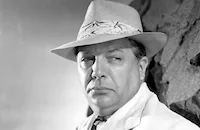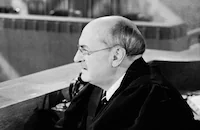Twelve Crowded Hours

Brief Synopsis
Cast & Crew
Lew Landers
Richard Dix
Lucille Ball
Allan Lane
Donald Macbride
Cyrus W. Kendall
Film Details
Technical Specs

Synopsis
Newspaper reporter Nick Green tries to save sweetheart Paula Sanders' brother Dave from a murder charge, for he knows that the guilty party is George Costain, the leader of a policy game racket. Nick runs into Costain getting off a train with a satchel of the day's policy receipts, which he has recovered from Jerry Miller, one of his lieutenants who was trying to steal it. Inside the train compartment, Jerry lies dead, and although Nick suspects Costain of the crime, he is unable to prove it. Nick then steals the satchel, which sparks a game of wits between the gang boss and the reporter. Inspector Joe Keller also mixes in, as he is sore at Nick for giving "bum steer" in an effort to save Dave. Costain finally captures Paula and Nick and takes them to his nightclub, where Nick cleverly stalls for time, knowing that as soon as the gangster finds out where the satchel is hidden, his life will not be worth a nickel. Nick finally tricks Costain into going to his apartment, where Paula shoots the gang boss and his henchmen spirit him away. In the ensuing chase, with the inspector on their heels, the gangsters are wiped out and Dave is exonerated of murder.

Director

Lew Landers
Cast

Richard Dix

Lucille Ball
Allan Lane

Donald Macbride

Cyrus W. Kendall

Granville Bates

John Arledge

Bradley Page

Dorothy Lee

Addison Richards
Murray Alper

John Gallaudet
Joseph De Stephani
Anthony Warde
Lee Van Atta
Emory Parnell
Edgar Dearing
Richard Clarke
Jack Rice
Roy Turner
Stanley Blystone
Al Herman
Greta Meyer
George Davis
Dorothy Lovett
Eleanor Hansen
Bruce Sidney
Eddie Cobb
Crew
Joe Bigelow
Albert D'agostino
Garrett Fort
Lee Marcus
Henry Marker
Hugh Mcdowell Jr.
Nicholas Musuraca
Van Nest Polglase
Renie
Sam Ruman
Peter Ruric
Robert Sisk
John Twist
Vernon L. Walker
Roy Webb

Film Details
Technical Specs

Articles
Twelve Crowded Hours
Before she became the beloved Queen of Television, Ball slogged through a mediocre movie career that only occasionally hinted at what she could do. Twelve Crowded Hours was made during a busy few months which Ball later referred to as her "Queen of the B's" period. Ball's statuesque good looks, which had landed her in the movies in the first place, worked against casting her in the comedy roles for which she was destined, and she spent most of the 1930s barely making an impression at all.
Signed to a contract at RKO in 1935, Ball played bit parts, studied with drama coach Lela Rogers (mother of Ginger), and started landing wisecracking roles in A-pictures such as Stage Door (1937). "Eve Arden and I competed for years," Ball later recalled. "I was sick and tired of 'drop gag' parts where I strolled through a room, dropped an acidly-humorous remark, and left." Even when she got an opportunity, it never quite seemed to pan out. She was the female lead in a Marx Brothers film, Room Service (1938), but neither the film nor Ball were memorable, and the Marx Brothers got all the laughs. Shortly before making Twelve Crowded Hours, Ball was one of the dozens of actresses who auditioned for the role of Scarlett O'Hara in Gone with the Wind (1939). On her way to the audition, she was drenched in a sudden rainstorm, and showed up in David Selznick's office soaking wet, and so nervous that she fell to her knees in front of him. After The Affairs of Annabel (1938) and Annabel Takes a Tour (1938), RKO executives planned to continue the Annabel films as a B-series, but changed their minds when co-star Jack Oakie demanded too much money. Most tantalizing of all, in 1939, RKO's newly-signed wunderkind, Orson Welles, reportedly wanted Ball to star in his first film for the studio, but studio executives vetoed that idea, telling Welles that Ball couldn't carry a film.
Twelve Crowded Hours leading man Richard Dix, who had been a major star in the silent era, had made a triumphant transition to sound films, earning an Academy Award nomination for his performance in Cimarron (1931), one of his first films under contract at RKO. But by the end of the decade, he was mostly starring in B-movies, although he remained popular until his retirement in 1947. Dix died in 1949, at age 55.
Allan Lane, who played Ball's brother in Twelve Crowded Hours, is an actor whose name and face may not be as familiar as his voice. He would later provide the vocals for the talking horse in the television series, Mr. Ed.
Ball, of course, would ultimately find the stardom she yearned for in television. She would also have her revenge on the studio that did not consider her star material. In 1957, Ball and her husband Desi Arnaz bought the RKO studio and turned it into the production facility for their company, Desilu.
Director: Lew Landers
Producer: Robert Sisk
Screenplay: John Twist, based on a story by Garrett Fort and Peter Ruric
Cinematography: Nicholas Musuraca
Editor: Harry Marker
Costume Design: Renie
Cast: Richard Dix (Nick Green), Lucille Ball (Paula Sanders), Allan Lane (Dave Sanders), Donald MacBride (Inspector Keller), Cyrus W. Kendall (Costain), Granville Bates (McEwan), John Arledge (Red), Bradley Page (Tom Miller).
BW-65m.
by Margarita Landazuri














